- Joined
- Mar 31, 2020
- Messages
- 9,153
- Points
- 113
What we know about Moderna's coronavirus vaccine and how it differs from Pfizer's
cnn.com
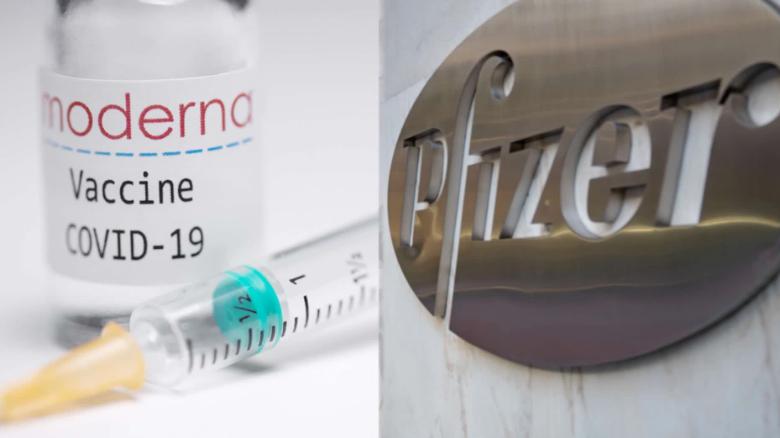 (CNN)Moderna's coronavirus vaccine candidate is similar to the Pfizer-BioNTech vaccine that was authorized and shipped out to the first Americans earlier this week.
(CNN)Moderna's coronavirus vaccine candidate is similar to the Pfizer-BioNTech vaccine that was authorized and shipped out to the first Americans earlier this week.
But there are a few key differences. Most importantly, Moderna's vaccine can be stored in normal freezers and does not require a super-cold transportation network, making it more accessible for smaller facilities and local communities.
The US Food and Drug Administration's vaccine advisory committee meets Thursday to review whether to recommend emergency use authorization for Moderna's vaccine, with the FDA's decision expected by Friday.
Here's a look at what we know about the Moderna vaccine and how it compares to Pfizer's.
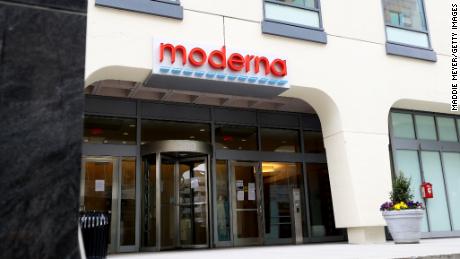 While Pfizer is a pharmaceutical behemoth, Moderna -- short for modified RNA -- is a biotech company based in Cambridge, Massachusetts.
While Pfizer is a pharmaceutical behemoth, Moderna -- short for modified RNA -- is a biotech company based in Cambridge, Massachusetts.
Established in 2010, Moderna has never brought a product to market, or gotten any of its nine or so vaccine candidates approved for use by the FDA. It had also never brought a product to phase three of a clinical trial previously.
The company's scientists had already been collaborating with researchers from the National Institutes of Health on a vaccine for another coronavirus, Middle Eastern Respiratory Syndrome (MERS). When Chinese researchers released the genomic sequence for the novel coronavirus in mid-January, they had a jump start.
The vaccine, called mRNA-1273, had development help from the National Institute of Allergy and Infectious Diseases. The US Biomedical Advance Research and Development Authority, known as BARDA, supported late-stage clinical trials and has helped scale up manufacturing.
The FDA green-lit clinical trials of Moderna's vaccine on March 3, the first out of the gate. Its advanced stage clinical trial started July 27 and it was the first government-funded Phase 3 clinical trial for a Covid-19 vaccine in the US. The company applied to the FDA for emergency use authorization for the vaccine on November 30.
The Moderna vaccine was effective in preventing Covid-19 cases in total and in limiting severe Covid-19 during the trial.
The vaccine's efficacy against Covid-19 was 94.1%, occurring at least 14 days after the second dose, according to a briefing document released by an advisory committee to the FDA.
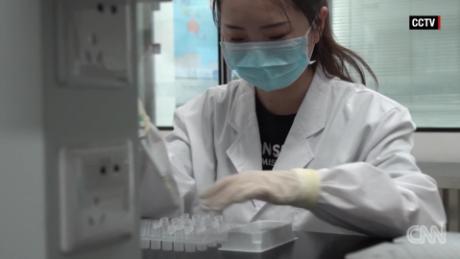
In Moderna's trial, 15,000 study participants were given a placebo, which is a shot of saline that has no effect. Over several months, 185 of them developed Covid-19, with 30 developing severe forms of the disease. One of them died.
Another 15,000 participants were given the vaccine, and only 11 of them developed Covid-19. None of the 11 became severely ill.
The vaccine was effective across age groups, genders, racial and ethnic groups, and participants with medical comorbidities associated with high risk of severe Covid-19, according to the briefing document. About 10% of study participants were Black and 20% were of Hispanic or Latino.
Like Pfizer's vaccine, Moderna's delivers messenger RNA, or mRNA, which is a genetic recipe for making a piece of the spikes that sit atop the coronavirus. Once injected, the body's immune system makes antibodies to the spikes. If a vaccinated person is later exposed to the coronavirus, those antibodies should stand at the ready to attack the virus.
The Moderna vaccine in particular contains a synthetic mRNA that codes for a structure called the "pre-fusion stabilized spike glycoprotein" of the virus.
The vaccine also contains fatty materials called lipids, tromethamine, tromethamine hydrochloride, acetic acid, sodium acetate and sucrose.
How is Moderna's vaccine different from Pfizer's?
The two vaccines are very similar, but they have a few key differences that make Moderna's vaccine "more flexible," as US Health and Human Services Secretary Alex Azar said last month.
Efficacy: Both Moderna's and the Pfizer-BioNTech vaccine have shown similar efficacy levels of near 95%.
"They appear to be roughly equivalent," said Dr. Paul Offit, a member of the FDA's vaccine advisory committee, during an appearance on CNN's "New Day" on Tuesday.
Structure: Both vaccines rely on mRNA, or messenger RNA, to work, although with slightly different structures and makeup.
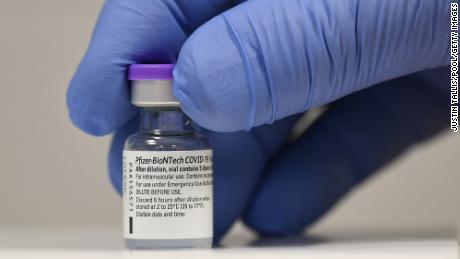
"Even though they're both messenger RNA vaccines, they're really different messenger RNA molecules, they have different so-called lipid delivery systems, meaning the sort of fatty droplet in which the messenger RNA is located," Offit said on Monday. "That's why they have different storage and handling characteristics."
Cold storage: Most importantly, Moderna's vaccine does not need to be kept at super-cold temperatures, like Pfizer's.
The Pfizer vaccine needs to be stored at about minus-75 degrees Celsius, about 50 degrees colder than any vaccine currently used in the US. The vaccine can be put in the refrigerator for only up to five days before it expires.
To accommodate that, the CDC created a complex set of handling and storage requirements known as the "cold chain" that included expensive ultra-cold freezers and lots of dry ice.
In contrast, Moderna's vaccine can be kept at about minus-20 degrees Celsius, or about the temperature of a home freezer, according to Moncef Slaoui, the head of the US effort to develop a vaccine for Covid-19. Moderna's vaccine can also be kept in a refrigerator for 30 days before it expires.
"So that's more manageable and much more commonly available," Slaoui said Tuesday.
These differences suggest that Pfizer's vaccine may be used more for major institutions with established infrastructure like hospitals, while Moderna's may be more useful to smaller facilities like a local chain or pharmacist.
Dosage and timing: Moderna's vaccine is administered as two 100-microgram doses given 28 days apart. Pfizer's vaccine is administered as two 30-microgram doses given 21 days apart.
Age: If authorized, the Moderna vaccine would be used in people 18 and older, while the Pfizer vaccine was authorized for people 16 and older.
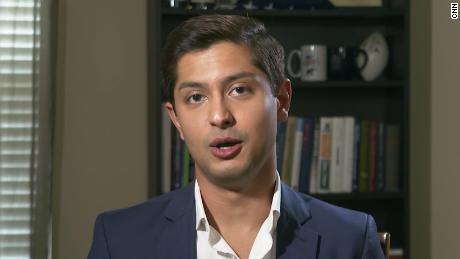
 MUST WATCH
MUST WATCH
The vaccine has a "favorable" safety profile, the briefing document to the FDA says, "with no specific safety concerns identified" that would prevent it from getting emergency authorization.
The most common adverse reactions to the vaccine have been injection site pain, fatigue, headache, muscle pain, joint pain and chills, according to the document. Swollen lymph nodes have also been reported.
Overall, "the frequency of non-fatal serious adverse events was low and without meaningful imbalances" between the group that received the vaccine and the group that received the placebo.
One study participant, 24-year-old Yasir Batalvi, told CNN he got a low-grade fever, fatigue and chills after getting the second shot of what he believed to be the real vaccine. He was fine by the next morning.
Slaoui, the Operation Warp Speed chief scientific adviser, has said about 10-15% of immunized study subjects will develop "quite noticeable side effects."
When will I be able to get it?
The US initially purchased 100 million doses of Moderna's vaccine, and last week agreed to buy 100 million more doses. Moderna began manufacturing the first 100 million doses while clinical trials were getting underway, Health and Human Services said in a statement.
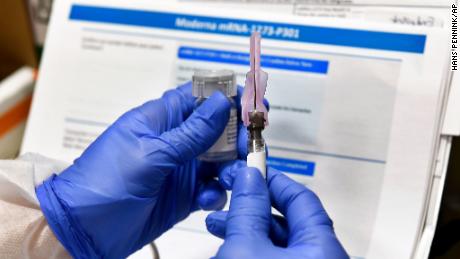
The vaccine still has to be authorized first. The FDA's advisory committee meets Thursday to discuss emergency use authorization for it, and Slaoui said he expects the committee to approve it by Friday.
If that happens, he said to expect shipments to begin 24 hours later in order for the vaccines to arrive at facilities by Monday morning.
There will be more than 6 million doses of Moderna vaccines shipped to more than 3,200 sites, far more than the 636 sites that Pfizer's vaccines were shipped to.
From there, the vaccines will be administered in an order established by state and local authorities. Vaccine advisers to the CDC recommended that health care workers and residents of long-term care facilities be first in line for any coronavirus vaccines that get emergency approval.
CNN Chief Medical correspondent Dr. Sanjay Gupta estimated that vaccines will be generally available by late spring or early summer.
CNN's Jen Christensen, Elizabeth Cohen and Naomi Thomas contributed to this report.
cnn.com

But there are a few key differences. Most importantly, Moderna's vaccine can be stored in normal freezers and does not require a super-cold transportation network, making it more accessible for smaller facilities and local communities.
The US Food and Drug Administration's vaccine advisory committee meets Thursday to review whether to recommend emergency use authorization for Moderna's vaccine, with the FDA's decision expected by Friday.
Here's a look at what we know about the Moderna vaccine and how it compares to Pfizer's.

Established in 2010, Moderna has never brought a product to market, or gotten any of its nine or so vaccine candidates approved for use by the FDA. It had also never brought a product to phase three of a clinical trial previously.
The company's scientists had already been collaborating with researchers from the National Institutes of Health on a vaccine for another coronavirus, Middle Eastern Respiratory Syndrome (MERS). When Chinese researchers released the genomic sequence for the novel coronavirus in mid-January, they had a jump start.
The vaccine, called mRNA-1273, had development help from the National Institute of Allergy and Infectious Diseases. The US Biomedical Advance Research and Development Authority, known as BARDA, supported late-stage clinical trials and has helped scale up manufacturing.
The FDA green-lit clinical trials of Moderna's vaccine on March 3, the first out of the gate. Its advanced stage clinical trial started July 27 and it was the first government-funded Phase 3 clinical trial for a Covid-19 vaccine in the US. The company applied to the FDA for emergency use authorization for the vaccine on November 30.
The Moderna vaccine was effective in preventing Covid-19 cases in total and in limiting severe Covid-19 during the trial.
The vaccine's efficacy against Covid-19 was 94.1%, occurring at least 14 days after the second dose, according to a briefing document released by an advisory committee to the FDA.

In Moderna's trial, 15,000 study participants were given a placebo, which is a shot of saline that has no effect. Over several months, 185 of them developed Covid-19, with 30 developing severe forms of the disease. One of them died.
Another 15,000 participants were given the vaccine, and only 11 of them developed Covid-19. None of the 11 became severely ill.
The vaccine was effective across age groups, genders, racial and ethnic groups, and participants with medical comorbidities associated with high risk of severe Covid-19, according to the briefing document. About 10% of study participants were Black and 20% were of Hispanic or Latino.
Like Pfizer's vaccine, Moderna's delivers messenger RNA, or mRNA, which is a genetic recipe for making a piece of the spikes that sit atop the coronavirus. Once injected, the body's immune system makes antibodies to the spikes. If a vaccinated person is later exposed to the coronavirus, those antibodies should stand at the ready to attack the virus.
The Moderna vaccine in particular contains a synthetic mRNA that codes for a structure called the "pre-fusion stabilized spike glycoprotein" of the virus.
The vaccine also contains fatty materials called lipids, tromethamine, tromethamine hydrochloride, acetic acid, sodium acetate and sucrose.
How is Moderna's vaccine different from Pfizer's?
The two vaccines are very similar, but they have a few key differences that make Moderna's vaccine "more flexible," as US Health and Human Services Secretary Alex Azar said last month.
Efficacy: Both Moderna's and the Pfizer-BioNTech vaccine have shown similar efficacy levels of near 95%.
"They appear to be roughly equivalent," said Dr. Paul Offit, a member of the FDA's vaccine advisory committee, during an appearance on CNN's "New Day" on Tuesday.
Structure: Both vaccines rely on mRNA, or messenger RNA, to work, although with slightly different structures and makeup.

"Even though they're both messenger RNA vaccines, they're really different messenger RNA molecules, they have different so-called lipid delivery systems, meaning the sort of fatty droplet in which the messenger RNA is located," Offit said on Monday. "That's why they have different storage and handling characteristics."
Cold storage: Most importantly, Moderna's vaccine does not need to be kept at super-cold temperatures, like Pfizer's.
The Pfizer vaccine needs to be stored at about minus-75 degrees Celsius, about 50 degrees colder than any vaccine currently used in the US. The vaccine can be put in the refrigerator for only up to five days before it expires.
To accommodate that, the CDC created a complex set of handling and storage requirements known as the "cold chain" that included expensive ultra-cold freezers and lots of dry ice.
In contrast, Moderna's vaccine can be kept at about minus-20 degrees Celsius, or about the temperature of a home freezer, according to Moncef Slaoui, the head of the US effort to develop a vaccine for Covid-19. Moderna's vaccine can also be kept in a refrigerator for 30 days before it expires.
"So that's more manageable and much more commonly available," Slaoui said Tuesday.
These differences suggest that Pfizer's vaccine may be used more for major institutions with established infrastructure like hospitals, while Moderna's may be more useful to smaller facilities like a local chain or pharmacist.
Dosage and timing: Moderna's vaccine is administered as two 100-microgram doses given 28 days apart. Pfizer's vaccine is administered as two 30-microgram doses given 21 days apart.
Age: If authorized, the Moderna vaccine would be used in people 18 and older, while the Pfizer vaccine was authorized for people 16 and older.


The vaccine has a "favorable" safety profile, the briefing document to the FDA says, "with no specific safety concerns identified" that would prevent it from getting emergency authorization.
The most common adverse reactions to the vaccine have been injection site pain, fatigue, headache, muscle pain, joint pain and chills, according to the document. Swollen lymph nodes have also been reported.
Overall, "the frequency of non-fatal serious adverse events was low and without meaningful imbalances" between the group that received the vaccine and the group that received the placebo.
One study participant, 24-year-old Yasir Batalvi, told CNN he got a low-grade fever, fatigue and chills after getting the second shot of what he believed to be the real vaccine. He was fine by the next morning.
Slaoui, the Operation Warp Speed chief scientific adviser, has said about 10-15% of immunized study subjects will develop "quite noticeable side effects."
When will I be able to get it?
The US initially purchased 100 million doses of Moderna's vaccine, and last week agreed to buy 100 million more doses. Moderna began manufacturing the first 100 million doses while clinical trials were getting underway, Health and Human Services said in a statement.

The vaccine still has to be authorized first. The FDA's advisory committee meets Thursday to discuss emergency use authorization for it, and Slaoui said he expects the committee to approve it by Friday.
If that happens, he said to expect shipments to begin 24 hours later in order for the vaccines to arrive at facilities by Monday morning.
There will be more than 6 million doses of Moderna vaccines shipped to more than 3,200 sites, far more than the 636 sites that Pfizer's vaccines were shipped to.
From there, the vaccines will be administered in an order established by state and local authorities. Vaccine advisers to the CDC recommended that health care workers and residents of long-term care facilities be first in line for any coronavirus vaccines that get emergency approval.
CNN Chief Medical correspondent Dr. Sanjay Gupta estimated that vaccines will be generally available by late spring or early summer.
CNN's Jen Christensen, Elizabeth Cohen and Naomi Thomas contributed to this report.
